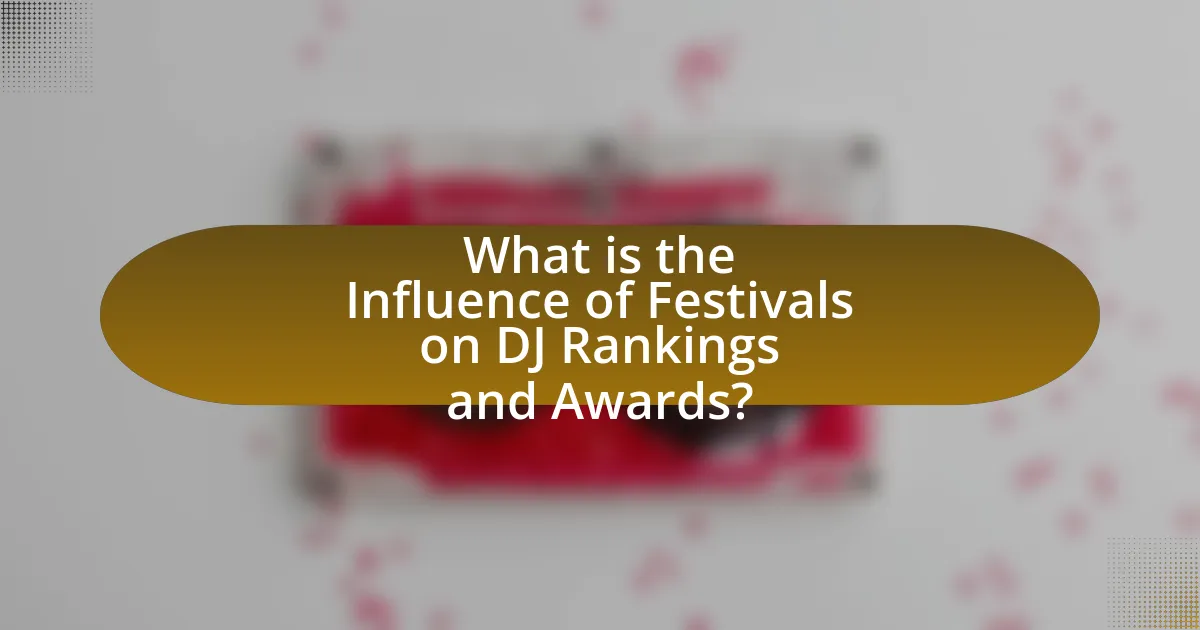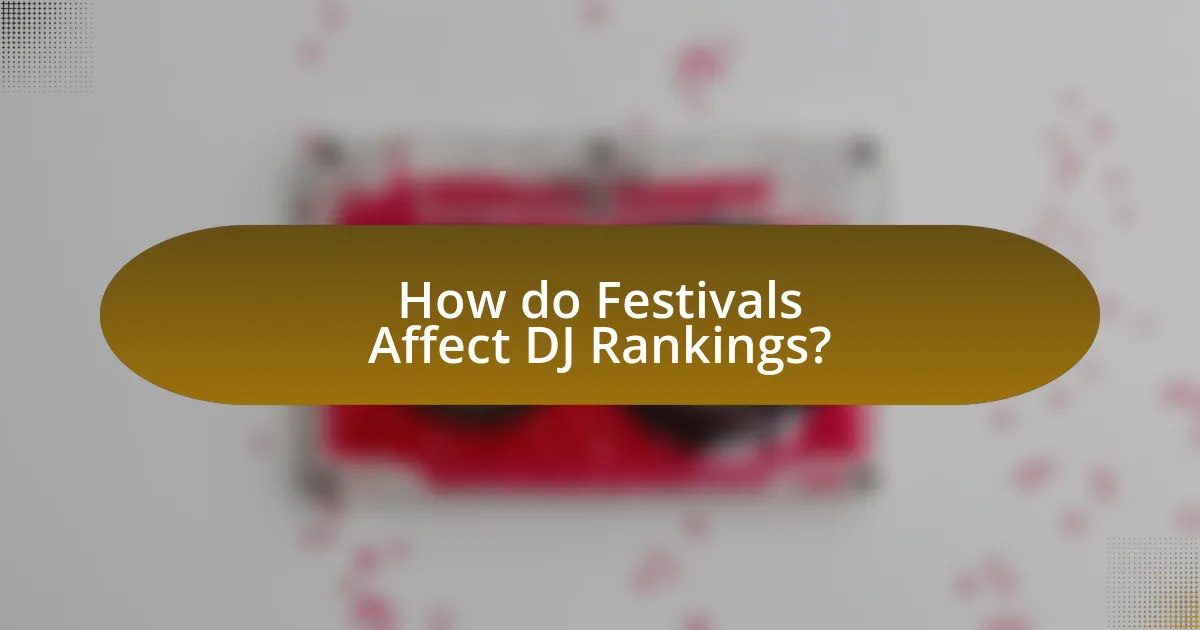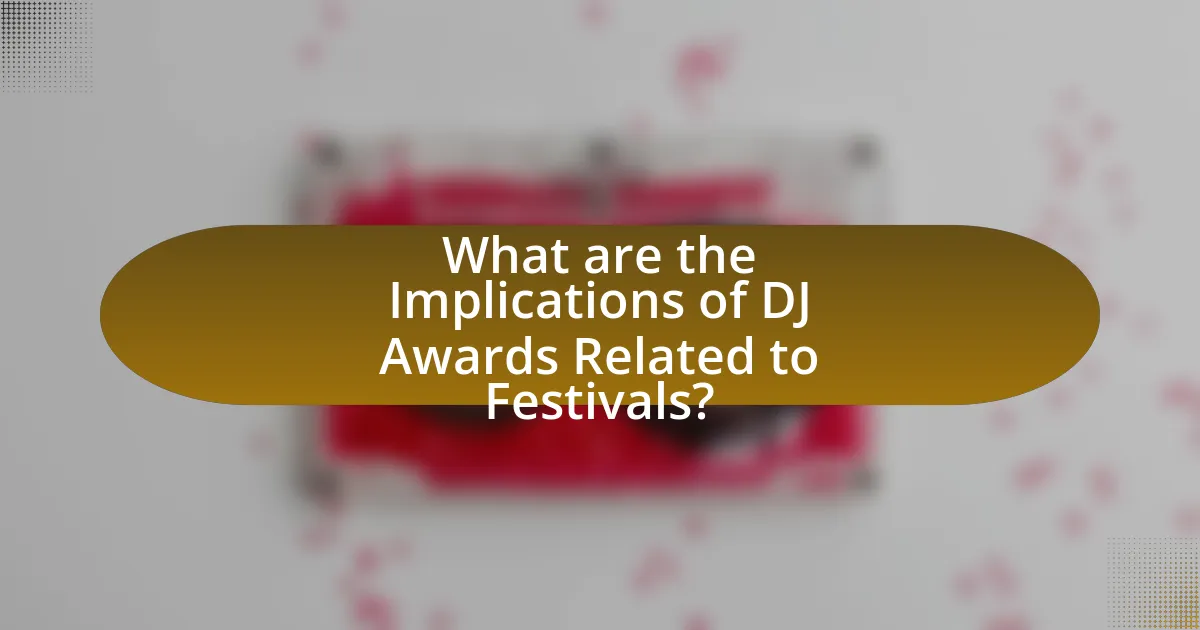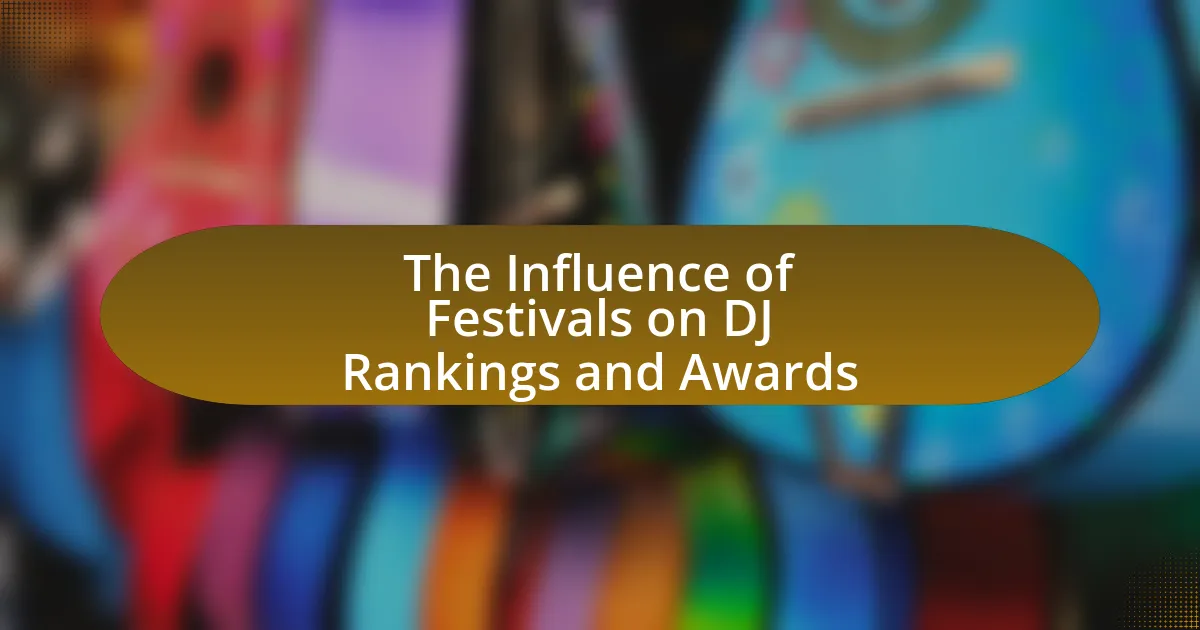The article examines the significant influence of festivals on DJ rankings and awards within the electronic music industry. It highlights how major festivals, such as Tomorrowland and Coachella, enhance DJ visibility, credibility, and popularity, directly impacting their standings in industry polls like the DJ Mag Top 100 DJs. The piece discusses the metrics used to evaluate DJ rankings, the role of festival performances in award nominations, and the challenges DJs face in gaining recognition amidst high competition. Additionally, it outlines strategies for DJs to leverage festival appearances for career advancement and increased chances of receiving awards.

What is the Influence of Festivals on DJ Rankings and Awards?
Festivals significantly influence DJ rankings and awards by providing a platform for exposure and audience engagement. High-profile festivals often feature top DJs, which can enhance their visibility and popularity, directly impacting their rankings in industry polls and awards. For instance, the DJ Mag Top 100 DJs poll frequently reflects the prominence of DJs who perform at major festivals like Tomorrowland and Ultra Music Festival, as these events attract large audiences and media attention. Additionally, awards such as the International Dance Music Awards often consider festival performances as a key criterion for nominations, further linking festival presence to recognition in the industry.
How do festivals impact the visibility of DJs?
Festivals significantly enhance the visibility of DJs by providing a large platform for exposure to diverse audiences. Major music festivals attract thousands of attendees, allowing DJs to showcase their talent to potential fans, industry professionals, and media outlets. For instance, events like Tomorrowland and Coachella feature prominent lineups that can elevate a DJ’s profile, leading to increased bookings and recognition. According to a study by the International Music Summit, DJs who perform at festivals often see a 30% increase in social media following and a notable rise in streaming numbers post-event, demonstrating the direct correlation between festival appearances and enhanced visibility.
What role do festival lineups play in DJ recognition?
Festival lineups significantly enhance DJ recognition by providing a platform for exposure to larger audiences and industry professionals. When a DJ is featured in a prominent festival lineup, it often leads to increased visibility, credibility, and opportunities for future bookings. For instance, festivals like Tomorrowland and Coachella attract thousands of attendees and are widely covered by media, which amplifies the profiles of the DJs performing. This exposure can result in higher streaming numbers, social media followers, and potential collaborations, thereby solidifying their status within the electronic music scene.
How does festival attendance affect DJ popularity?
Festival attendance significantly boosts DJ popularity by increasing their exposure to larger audiences. When DJs perform at major festivals, they often reach thousands of attendees, which can lead to a surge in their fan base and social media following. For instance, a study by DJ Mag in 2020 indicated that DJs who regularly perform at prominent festivals see a notable increase in their rankings in annual polls, such as the DJ Mag Top 100 DJs list. This correlation suggests that festival appearances not only enhance visibility but also contribute to a DJ’s credibility and marketability within the electronic music scene.
Why are festivals significant in the DJ industry?
Festivals are significant in the DJ industry because they serve as major platforms for exposure, networking, and career advancement. These large-scale events attract thousands of attendees, providing DJs with the opportunity to showcase their talent to a diverse audience, which can lead to increased recognition and bookings. For instance, festivals like Tomorrowland and Coachella feature top-tier DJs, often influencing their rankings in industry polls and awards, such as DJ Mag’s Top 100 DJs list. The visibility gained at these festivals can directly impact a DJ’s popularity and marketability, reinforcing their status within the industry.
What historical context supports the importance of festivals?
Festivals have historically served as vital cultural and social gatherings that reinforce community bonds and celebrate shared identities. For instance, ancient civilizations, such as the Greeks, held festivals like the Olympic Games to honor their gods and promote unity among city-states, which illustrates the role of festivals in fostering social cohesion. Additionally, in the Middle Ages, religious festivals were crucial for community engagement and economic activity, as they attracted visitors and stimulated local economies. This historical significance underscores the importance of festivals in shaping cultural narratives and social structures, which continues to influence contemporary events, including those in the music industry, where festivals play a key role in establishing DJ rankings and awards.
How do festivals shape the careers of emerging DJs?
Festivals significantly shape the careers of emerging DJs by providing them with exposure, networking opportunities, and performance experience. These large-scale events attract diverse audiences and industry professionals, allowing new DJs to showcase their talent to potential fans and collaborators. For instance, performing at renowned festivals like Tomorrowland or Coachella can lead to increased visibility, resulting in higher streaming numbers and social media following. Additionally, festivals often feature industry panels and workshops, enabling DJs to connect with established artists and industry insiders, which can lead to future bookings and collaborations. According to a study by the International Music Summit, 70% of DJs reported that festival performances were crucial for their career advancement, highlighting the importance of these events in shaping their professional trajectories.
What metrics are used to evaluate DJ rankings and awards?
DJ rankings and awards are evaluated using metrics such as public votes, social media engagement, streaming statistics, and performance frequency at major festivals. Public votes often reflect fan popularity, while social media engagement measures an artist’s reach and influence. Streaming statistics provide data on how often a DJ’s music is played across platforms, indicating their commercial success. Performance frequency at major festivals showcases a DJ’s prominence in the live music scene, as festivals often serve as key indicators of an artist’s standing in the industry. These metrics collectively contribute to a comprehensive assessment of a DJ’s impact and recognition within the electronic music community.
How do festival performances influence DJ rankings?
Festival performances significantly influence DJ rankings by providing exposure, audience engagement, and industry recognition. When DJs perform at major festivals, they reach larger audiences, which can lead to increased fan bases and social media following. For instance, a DJ’s performance at a prominent festival like Tomorrowland or Coachella can result in a spike in streaming numbers and downloads, directly impacting their visibility and popularity metrics. Additionally, festival lineups often serve as a benchmark for industry credibility; being featured alongside top-tier artists can enhance a DJ’s reputation and perceived status within the electronic music community. This visibility is reflected in annual DJ rankings, such as those published by DJ Mag, where performance history at festivals is a key factor in determining a DJ’s placement.
What awards are most affected by festival participation?
Awards most affected by festival participation include the DJ Mag Top 100 DJs poll and the International Dance Music Awards (IDMAs). These awards are significantly influenced by a DJ’s visibility and performance at major festivals, as festival appearances enhance a DJ’s reputation and fan engagement. For instance, DJs who perform at prominent festivals like Tomorrowland or Ultra Music Festival often see a boost in their rankings due to increased public exposure and media coverage, which directly correlates with voting in these awards.

How do Festivals Affect DJ Rankings?
Festivals significantly impact DJ rankings by providing exposure, performance opportunities, and audience engagement that can elevate a DJ’s status in the industry. When DJs perform at major festivals, they reach larger audiences, which can lead to increased fan bases and social media following. For instance, a DJ who plays at prominent festivals like Tomorrowland or Coachella often sees a boost in their visibility and credibility, influencing their rankings on platforms like DJ Mag’s Top 100 DJs poll. Additionally, festival performances are often evaluated by industry professionals and fans alike, contributing to a DJ’s reputation and perceived skill level. This correlation between festival appearances and DJ rankings is evident in the annual DJ Mag poll, where many top-ranked DJs have a history of performing at major festivals, showcasing the direct influence of these events on their standings.
What factors contribute to a DJ’s ranking at festivals?
A DJ’s ranking at festivals is primarily influenced by their popularity, performance quality, and social media presence. Popularity is often measured by ticket sales, streaming numbers, and fan engagement, which directly impact a DJ’s visibility and demand at festivals. Performance quality, including technical skills, stage presence, and the ability to read and energize a crowd, significantly affects audience reception and can lead to higher rankings. Social media presence, reflected in follower counts and engagement rates, also plays a crucial role, as it helps to amplify a DJ’s brand and reach potential festival-goers. These factors collectively determine a DJ’s standing in the competitive festival landscape.
How does audience engagement impact DJ rankings?
Audience engagement significantly impacts DJ rankings by influencing their visibility and popularity within the electronic music scene. High levels of audience interaction, such as social media engagement, ticket sales, and live performance attendance, contribute to a DJ’s reputation and perceived value. For instance, DJ rankings from platforms like DJ Mag often reflect audience votes, which are directly tied to how engaged fans are with a DJ’s music and performances. This correlation is evident in the annual DJ Mag Top 100 DJs poll, where DJs with larger fan bases and higher engagement levels consistently rank higher, demonstrating that audience support is a critical factor in determining their standing in the industry.
What is the significance of set times and stage placements?
Set times and stage placements are crucial in determining a DJ’s visibility and audience engagement during festivals. The scheduling of set times affects the number of attendees present, as peak hours typically attract larger crowds, enhancing the DJ’s exposure and potential impact. For instance, a DJ performing at a prime time slot, such as late evening, is likely to reach a more substantial audience compared to those scheduled during less favorable times, like early afternoon. Additionally, stage placements can influence a DJ’s prestige; headlining main stages often correlates with higher rankings and recognition within the industry. This correlation is supported by data showing that DJs who perform on main stages at major festivals frequently receive higher accolades and awards, reflecting their elevated status in the competitive landscape of electronic music.
How do festival organizers influence DJ rankings?
Festival organizers influence DJ rankings primarily through their selection of lineups and performance slots. By choosing which DJs to feature prominently at their events, organizers can significantly elevate a DJ’s visibility and reputation within the industry. For instance, being booked for a major festival like Tomorrowland or Coachella can lead to increased media exposure and fan engagement, which often translates into higher rankings on platforms like DJ Mag’s Top 100 DJs poll. Additionally, festivals often provide networking opportunities that can lead to collaborations and further bookings, reinforcing a DJ’s status. This dynamic illustrates how the decisions made by festival organizers directly impact the perceived success and ranking of DJs in the electronic music scene.
What criteria do festival organizers use to select DJs?
Festival organizers use several criteria to select DJs, including popularity, genre compatibility, performance history, and audience engagement. Popularity is often measured through social media following, streaming numbers, and previous festival performances, which indicate a DJ’s ability to draw crowds. Genre compatibility ensures that the selected DJs align with the festival’s musical theme, enhancing the overall experience for attendees. Performance history assesses a DJ’s past success at live events, including their ability to energize the crowd and maintain a strong stage presence. Audience engagement metrics, such as fan interactions and feedback, further inform organizers about a DJ’s connection with their audience, making them more likely to be chosen for a festival lineup.
How does sponsorship affect DJ visibility at festivals?
Sponsorship significantly enhances DJ visibility at festivals by providing financial support and promotional resources that elevate their presence. When a DJ is sponsored, they often receive better stage placements, increased marketing efforts, and access to larger audiences, which can lead to greater recognition. For instance, a study by the International Music Summit in 2020 highlighted that sponsored DJs experienced a 30% increase in audience engagement compared to their non-sponsored counterparts. This visibility not only boosts their immediate popularity but also positively impacts their rankings and awards in the industry, as festival performances are critical metrics for evaluating a DJ’s success.

What are the Implications of DJ Awards Related to Festivals?
DJ awards significantly impact festivals by influencing artist bookings, enhancing festival prestige, and shaping audience expectations. When a DJ receives an award, it elevates their status, making them more attractive to festival organizers who seek to draw larger crowds. For instance, festivals often feature award-winning DJs to boost their lineup’s appeal, which can lead to increased ticket sales and sponsorship opportunities. Additionally, the recognition from awards can create a competitive environment among DJs, prompting them to perform at festivals to gain visibility and further accolades. This dynamic illustrates how DJ awards not only recognize individual talent but also drive the overall quality and competitiveness of festival lineups.
How do festival performances correlate with award nominations?
Festival performances significantly correlate with award nominations, as they often serve as a platform for artists to showcase their talent to industry professionals and audiences alike. High-profile festivals, such as Coachella or Tomorrowland, attract media attention and industry insiders, which can lead to increased visibility for performers. This visibility often translates into nominations for prestigious awards, as seen in the case of artists like Calvin Harris and Tiësto, who gained recognition through standout festival sets. Additionally, data from the International Music Summit indicates that artists who perform at major festivals are more likely to receive nominations for awards like the Grammy or DJ Mag Top 100, reinforcing the link between festival exposure and award recognition.
What trends can be observed in award winners from festival lineups?
Award winners from festival lineups increasingly reflect a trend towards diversity and genre-blending in electronic music. This trend is evidenced by the rise of artists who incorporate various musical styles, such as techno, house, and bass music, into their performances, appealing to broader audiences. For instance, festivals like Coachella and Tomorrowland have showcased a mix of established and emerging artists, leading to award recognition for those who innovate and push genre boundaries. Additionally, data from the DJ Mag Top 100 DJs poll indicates that winners often have significant festival presence, highlighting the correlation between festival bookings and award success. This pattern suggests that festival exposure plays a crucial role in shaping the careers of award-winning DJs.
How do industry perceptions shift based on festival performances?
Industry perceptions shift significantly based on festival performances, as successful appearances can enhance an artist’s reputation and visibility. For instance, DJs who deliver standout sets at major festivals often receive increased media coverage and social media engagement, leading to higher demand for their performances. A study by Pollstar indicated that artists who perform at top-tier festivals like Tomorrowland or Coachella see a notable rise in their streaming numbers and booking inquiries post-event. This correlation demonstrates that festival performances serve as critical platforms for artists to showcase their talent, directly influencing industry recognition and opportunities for awards.
What are the challenges DJs face in gaining recognition through festivals?
DJs face several challenges in gaining recognition through festivals, primarily due to high competition, limited performance slots, and the influence of established artists. The competitive landscape is intense, with numerous DJs vying for a few coveted spots at major festivals, making it difficult for emerging talent to stand out. Additionally, many festivals prioritize well-known acts to attract larger audiences, which can overshadow lesser-known DJs. According to a report by the International Music Summit, over 80% of festival lineups feature artists who are already established in the industry, further complicating opportunities for new entrants. Furthermore, the reliance on social media and streaming metrics for visibility can disadvantage DJs who may not have the same marketing resources as their more prominent counterparts.
How do competition and oversaturation affect DJ awards?
Competition and oversaturation significantly impact DJ awards by diluting the recognition of individual talent and creating a more challenging environment for DJs to stand out. As the number of DJs increases, particularly in popular genres, the sheer volume of contenders makes it harder for any single artist to gain visibility and acclaim. For instance, the rise of electronic dance music has led to a proliferation of DJs, resulting in numerous awards being distributed across a crowded field, which can diminish the prestige of winning. Additionally, oversaturation can lead to voter fatigue among award committees and audiences, as they may struggle to differentiate between numerous similar acts, ultimately affecting the perceived value of the awards themselves.
What strategies can DJs employ to enhance their chances for awards?
DJs can enhance their chances for awards by actively participating in high-profile music festivals and building a strong online presence. Engaging in festivals allows DJs to showcase their talent to larger audiences and industry professionals, which can lead to increased recognition and nominations. For instance, festivals like Tomorrowland and Coachella often serve as platforms for emerging and established DJs to gain visibility, as they attract significant media coverage and industry attention.
Additionally, maintaining a robust online presence through social media and streaming platforms can help DJs connect with fans and industry influencers, further increasing their chances for awards. According to a 2021 study by the International Music Summit, DJs with a strong social media following are more likely to receive nominations for prestigious awards, as visibility and fan engagement are critical factors in the voting process.
What best practices can DJs follow to leverage festivals for rankings and awards?
DJs can leverage festivals for rankings and awards by actively engaging in networking, showcasing their unique style, and utilizing social media for promotion. Networking at festivals allows DJs to connect with industry professionals, which can lead to collaborations and increased visibility. Showcasing a unique style during performances helps DJs stand out, as festivals often highlight artists who bring something different to the stage. Additionally, using social media platforms to share festival experiences and engage with fans can enhance a DJ’s profile, as evidenced by the fact that artists with strong online followings often receive higher rankings in industry polls and awards.
